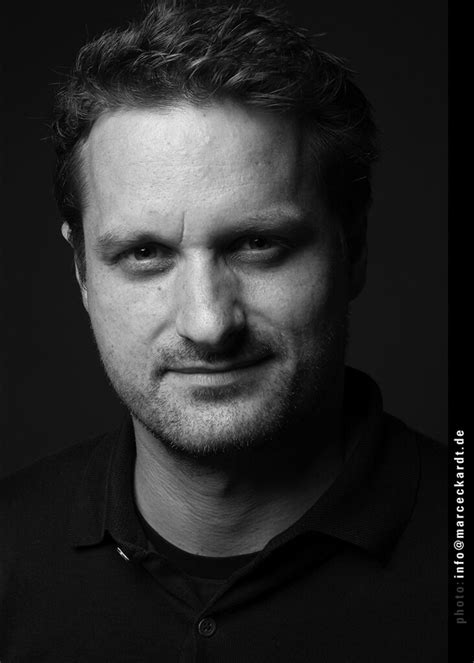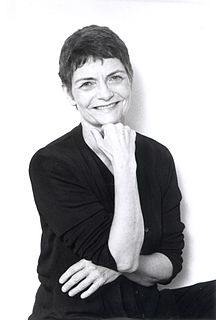Top 210 Interactive Quotes & Sayings - Page 4
Explore popular Interactive quotes.
Last updated on April 17, 2025.
The deep-read is when you get gut-hooked and dragged overboard down and down through the maze of print and find, to your amazement, you can breathe down there after all and there’s a whole other world. I’m talking about the kind of reading when you realize that books are indeed interactive. . . . I’m talking about the kind of deep-read where it isn’t just the plot or the characters that matter, but the words and the way they fit together and the meandering evanescent thoughts you think between the lines: the kind of reading where you are fleetingly aware of your own mind at work.
I can appreciate the idea that with e-books more people would publish, the work would be easier to disseminate, and that it could even be interactive. Being a lover of photography, I especially like the idea that you could include lots of pictures - full-color pictures - with your writing. That to me is exciting! We'll all have to stay tuned to see what develops.
We look at the human body as a biochemical machine controlled by genes and therefore we see a mechanical aspect to life and then try to understand the nature of mechanics by looking at how the physical parts interact with each other. If you want to understand life you just look at it as a whole series of interactive chemical reactions. What we are leaving out is the invisible elements, the contributions of the invisible world, which are emphasized in the nature of quantum mechanics. Matter is energy and is a primary factor that must be considered because everything is ultimately energy.
I think festivals are way more easygoing than back-to-back tours are. 'Cause for me, when you get to go to a festival, you get to hang out all day, and you're really taken care of, and there's usually a little artist village where all the artists have their own tents, and it's catered, and then you go and play an hour-long set depending on where you are on the lineup. And then you go back and you hang out and you even get to go watch other artists play. So it's really just a fun interactive experience for everybody.
Steve Jobs did not start started Apple as a scam. But he understood early on the power of marketing. The idea of the computer as a bicycle for the human mind - I think that was something he believed. He believed in making people comfortable with these machines, which is why he spent so much time thinking about how to design them a certain way, how to make them so user-friendly and interactive, and why he spent so much time studying the Zeitgeist.
Composing computer programs to solve scientific problems is like writing poetry. You must choose every word with care and link it with the other words in perfect syntax. There is no place for verbosity or carelessness. To become fluent in a computer lnaguage demands almost the antithesis of modern loose thinking. It requires many interactive sessions, the hands-on use of the device. You do not learn a foreign language from a book, rather you have to live in the country for year to let the langauge become an automatic part of you, and the same is true for computer languages.
"Playing" the resources of characterology for the sake of clarification and insight into the structures of actual existence is many times more daunting than playing a piano; it requires the thinking of chords of thoughts, not just isolated simplisms or abstracta; it demands the shaping or encompassing of morphological modes of intelligence that can comprehend gestalten, syndromes, historical and civilizational patterns in which it is not the particulars but their interactive significance (as an ensemble of actualities or principles) that is vital.
The Earth school is not a concept. It is an an ongoing 3-dimesional, full colour, hi-fidelity, interactive multi-media experience that does not end until your soul goes home (until you die). Every moment in the earth school offers you important opportunities to learn about yourself. Those things have to do with your soul. The Earth school operates with exquisite perfection and efficiency whether you are aware of it or not.
This is why it might be more useful to understand the proliferation of interactive media as an opportunity for renaissance: a moment when we have the ability to step out of the story altogether. Renaissances are historical instances of widespread recontextualisation. People in a variety of different arts, philosophies and sciences have the ability to reframe their reality. Renaissance literally means 'rebirth'. It is the rebirth of old ideas in a new context.
One of my brothers used to tell me all the time, "Listen, nobody is going to discover you in the living room." It's about being interactive in life and participating in your own life. Once you get a grasp on that, you understand. "OK, I can take a couple of knocks. They can hit me on the chin, and I can get up." That's what it's about. It's not about not getting knocked down but getting up. Making sure that you keep pursuing whatever that passion is. For me, that passion is entertainment.
When men sit around and talk, they are very competitive. One person will tell an anecdote and the next person will try to top that. When you get six women together, they share a lot more. They will be far more interested in what the other person has to say. The conservation is more interactive and less about individually showing off.
We could speak about the meaning of life vis-a-vis non-consequential/deontological theories, apodictic transformation schemata, the incoherence of exemplification, metaphysical realism, Cartesian interactive dualism, revised non reductive dualism, postmodernist grammatology and dicey dichotomies. But we would still be left with Nietzsche's preposterous mustache which instills great anguish and skepticism in the brain, which leads (as it did in his case) to utter madness. I suggest we go to Paris instead.
I am far more of a loner than people would imagine. But I am the most gregarious and socially interactive loner you ever met. The thing is, I am fascinated by people's stories and I'm very talkative and can't ever say no to anything or anyone, so I tend to over-socialize, to give away too much of my time to the many people I adore.
The frontier in space, embodied in the space colony, is one in which the interactions between humans and their environment is so much more sensitive and interactive and less tolerant of irresponsibility than it is on the whole surface of the Earth. We are going to learn how to relate to the Earth and our own natural environment here by looking seriously at space colony ecologies.
I have never written a musical. I have never written a weird, interactive piece of theater. I wanted to do something that would be disturbing. It will be disturbing theater with songs. There will be no people on wires. That's probably the next one of those things on my bucket list of things that I need to write before I get hit by that car.
It's a piece that is so interactive, and relies so much on these five men in the room, that I think will appeal to the life experiences every person has, in some small way. Every aspect of the play will in some way touch somebody or they'll know someone that has a likeness... very representative of real life.
From American Idol to The Matrix participatory media - where old and new media converge by involving fans - is influencing our culture by creating new forms of interactive storytelling. Yet by enabling people to participate in such various media they can converge as a crowd to alter the story to create new modes of engagement, some not necessarily endorsed by the creator - or the brands that back them.
There has been evolution in my work. In the beginning I was very much busy with the physical body and the limits of the physical body but that somehow naturally led me to the mental body and how I could deal with that. Stillness is so much harder, especially for three months. It was a big challenge. As a performer it is the most difficult experience one can have. And the interactive experience with the public made it even harder.
Twenty-eight years ago, I created my first game on an Apple II in my bedroom closet at a time when the interactive entertainment industry was taking its first baby steps. Today the games business has grown to a multi-billion dollar industry and we are just at the tip of the iceberg. I'm thrilled to have been a part of this successful journey and I'm extremely honored by the Academy's Hall of Fame induction.
The literary game is the abyss of human society itself: interactive, playful and tragic. We can't live alone. For me, Robinson [Crusoe] is either a false myth or else he represents the denial of human society. We can't play by ourselves. In literature, it's even more complicated, because one has to play with an indeterminate number of players simultaneously and every game is different. The other player can abandon your game at any time...to go play chess.
The functional freedom that anybody can buy a gun and go out and murder a lot of people at a McDonald's is prevalent, yes. But through the effects of TV and interactive video systems and so forth, we'll also have the freedom to pretend to be a mass murderer for the evening. I've seen descriptions of advanced TV systems in which a simulation of reality is computer controlledthe TV viewer of the future will wear a special helmet. You'll no longer be an external spectator to ?ction created by others, but an active participant in your own fantasies/dramas.
It will be interesting to see if Seoul's urban vocabulary of numerous, ever-present interactive screens will translate to other cities such as Beijing, London, and New York. It will also be intriguing to see if smaller cities and towns adopt aspects of Seoul's screen culture throughout Asia, Europe, and North America.
If I have my way, I want to go start making really interactive television. Stuff where you can sit and watch real actors do a real series and they can get into some kind of gun battle and all of a sudden your television prompts you to pick up your controller and all of a sudden, you're playing a first-person shooter.
Most kids come home from school. They don't go to their TVs first. They go to the Internet. They check their emails, or some blogs, or some sites. Then they go watch TV. Other people are at work all day 9-5 in front of a computer. They see certain clips. We're not going to hide the fact that people use the Internet. We're going to try to be as interactive as possible with our fans. I'm currently on Twitter and Facebook and Flicker and Dig. I'm on all that stuff.
When J.J. [Abrams] called Lisa [Joy] and myself, he pitched us this idea of, what if we turn the structure around and started with the hosts. For us, that gave us a way to play with everything that we're interested in, all at once. It's the ultimate playground for us because we deal with questions about artificial intelligence, which is something I've long been fascinated by, but also human intelligence, or the lack thereof, human behavior, and interactive, immersive storytelling.
I believe faith is a human universal. We are endowed at birth with nascent capacities for faith. How these capacities are activated and grow depends to a large extent on how we are welcomed into the world and what kinds of environments we grow in. Faith is interactive and social; it requires community, language, ritual and nurture. Faith is also shaped by initiatives from beyond us and other people, initiatives of spirit or grace. How these latter initiatives are recognized and imaged, or unperceived and ignored, powerfully affects the shape of faith in our lives.
Poetry and code - and mathematics - make us read differently from other forms of writing. Written poetry makes the silent reader read three kinds of pattern at once; code moves the reader from a static to an active, interactive and looped domain; while algebraic topology allows us to read qualitative forms and their transformations.





























